
Our future Speaker of the House John Boehner isn't afraid to cry in public.
He readily admits to being an emotional man. His friends and colleagues all know it and accept it and he's not about to change.
But what does he cry about?
During his victory speech on Election Night, Boehner teared up as he spoke about being a working class stiff who has been chasing the American Dream all his life. Now that he's gotten hold of the brass ring, however, the rest of us should realize that he has allied himself with a bunch of revolutionaries who seek to destroy that Dream by getting rid of "safety nets" and services that have helped the working class lead a decent comfortable life.
"I'm a regular guy with a big job" said Boehner off-handedly to Lesley Stahl in a "60 Minutes" interview where she cooed and giggled over him like a schoolgirl with a crush. She found the man likable because he was so "authentic." She predicts the public will like him, too, probably because he represents the epitome of the twentieth century log cabin story.
"I put myself through school, working every rotten job there was," he continued.
The small-town Ohioan grew up as the second oldest in a working class family with 12 kids. He went to Mass every morning at an all-boys Catholic school and lived in a small house with one bathroom and both parents--who happened to be John Kennedy Democrats.
Boehner worked in their father's bar in Reading outside Cincinnati where he mopped the floor, helped with breakfast, cleaned up the dishes and washed the windows.
He worked nights to pay for tuition at Xavier University in Cincinnati, a private Catholic institution, and became the first person in his family to attend college, which took him seven years to complete. He met Deborah, his future wife of 37 years, when he was a janitor on the night shift emptying the trash.
After college he got a sales job in the packaging and plastics industry and worked his way up to become president of the firm. He resigned in 1990 when he was elected to Congress.
These are all admirable qualities by working class standards but unlike most, the self-made man became a millionaire. He also said this was the time he converted to Reagan Republicanism because he was so shocked that taxes ate up so much of his income.
What's missing in this picture is the recognition that tax monies have always been critical to business success, including Boehner's. How? They provide the legal framework to enforce business contracts, roads and airports to transport goods and people, regulated utility rates that provide reasonably-priced utilities to industrial concerns and public schools and universities that provide a trained workforce. And yet, John Boehner thinks his success is due entirely to his own efforts and that he owes his fellow citizens nothing.
Now that he's in power, he wants to attack the public services and programs that make it possible for working class people to succeed just as he did. And in doing so, he is undercutting the most important resource that any business needs: well-educated, skilled and healthy people. He wants to do it by underfunding or defunding the monies used to subsidize state college tuition, public health, affordable housing, public education, public transportation and roads.
It shouldn't escape our attention that these things were made possible by those liberal New Deal Democrats, courtesy of the Franklin D. Roosevelt administration and his successors.
Over the past 100 years as the richest Americans have profited most from the United States' rise to world prominence and power, they have consistently complained about paying taxes.
(Note: You can view every article as one long page if you sign up as an Advocate Member, or higher).





